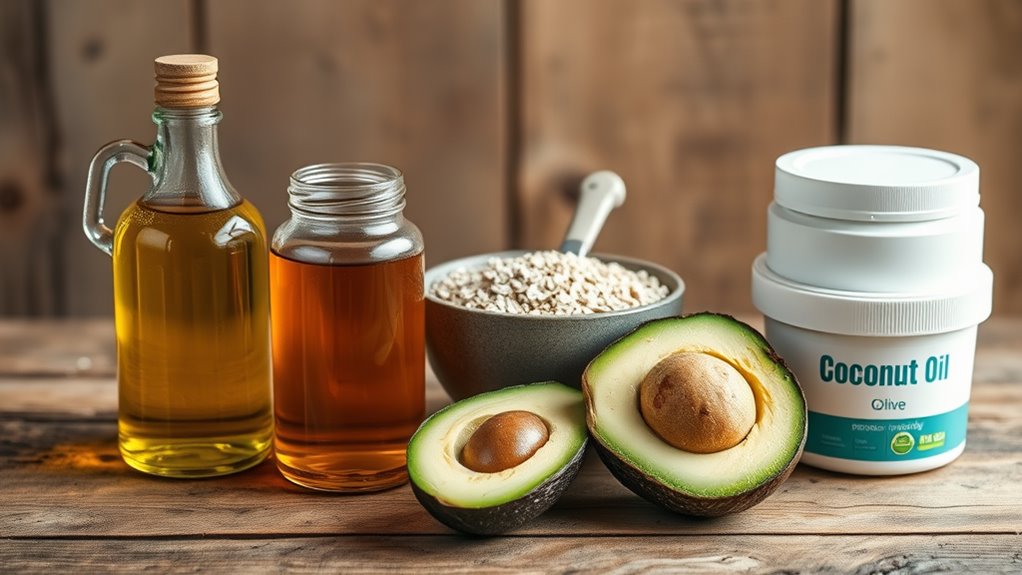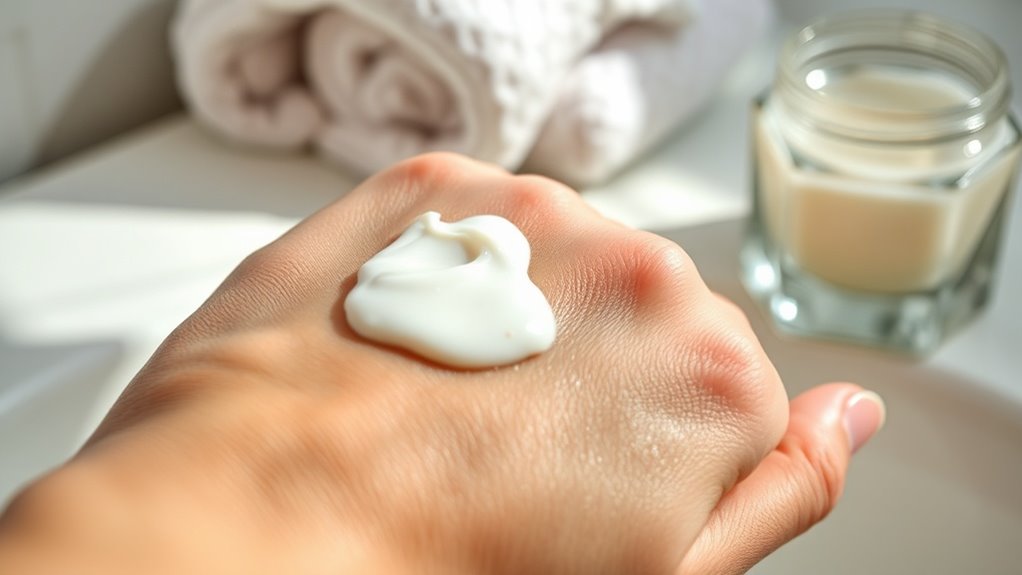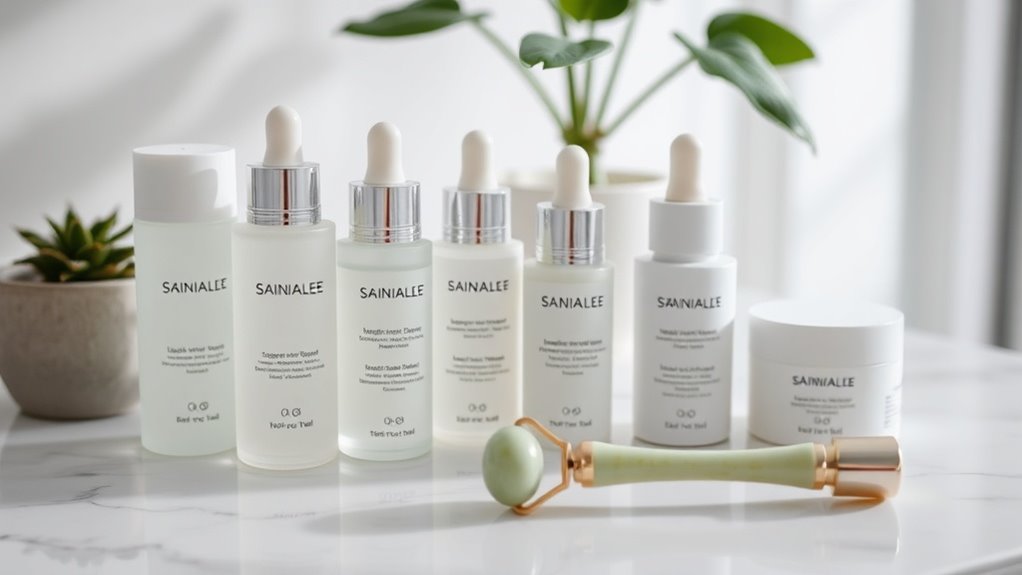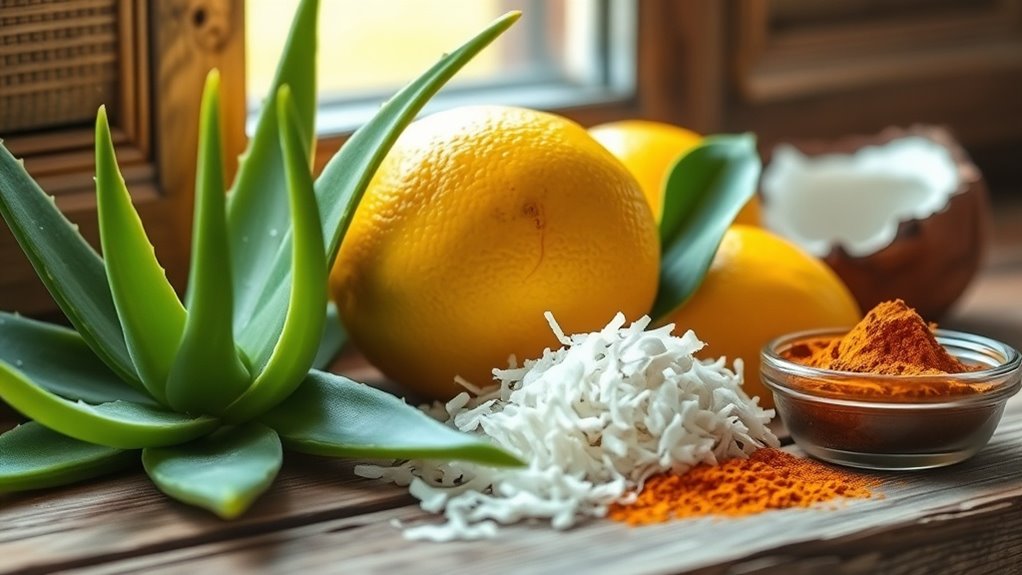Top 5 Kitchen Items That Work Wonders for Dry Skin
If you’re battling dry skin, you’ll find these top 5 kitchen staples incredibly effective: honey acts as a natural hydrator, drawing in moisture and reducing inflammation; olive oil provides deep moisturization to repair your skin’s barrier; oatmeal offers gentle exfoliation to smooth flakiness; yogurt soothes and nourishes with its probiotics; and coconut oil delivers lasting hydration to lock in essential moisture. Check out the details ahead for even better results.
Key Takeaways
- Honey acts as a natural hydrator, reducing inflammation and enhancing the skin barrier.
- Olive oil deeply moisturizes dry skin by locking in moisture and strengthening the lipid layer.
- Oatmeal gently exfoliates, reducing flakiness and soothing irritation on dry skin.
- Yogurt soothes and nourishes dry skin with lactic acid and probiotics.
- Coconut oil provides lasting hydration by sealing in moisture and offering antimicrobial benefits.
Honey as a Natural Hydrator
Honey serves as an excellent natural hydrator for dry skin, drawing moisture into your epidermis through its humectant properties. This method supports lasting hydration by promoting overall skin resilience through simple lifestyle adjustments.
In effective dry skin remedies, honey’s rich enzymes and antioxidants combat inflammation while sealing in hydration. Research from dermatological studies shows it reduces transepidermal water loss, enhancing your skin’s barrier and minimizing flakiness.
You’ll appreciate its antibacterial qualities, which soothe irritation without harsh chemicals.
For optimal results, apply raw honey as a simple mask twice weekly—mix with water if needed—and rinse after 15 minutes. This evidence-based approach keeps your skin soft, resilient, and revitalized.
To enhance hydration further, consider combining honey with hyaluronic acid for its exceptional ability to draw and retain moisture in the skin.
Olive Oil for Deep Moisturization
Olive oil serves as a potent emollient for dry skin, penetrating deeply with its rich fatty acids to lock in moisture and repair the barrier. Additionally, olive oil is effective for dehydrated skin by helping to restore water balance and prevent common signs like tightness.
You can massage a teaspoon into your skin after showering, allowing it to absorb fully for lasting hydration. Its oleic acid, backed by studies in the Journal of Cosmetic Dermatology, strengthens your skin’s lipid layer, reducing flakiness and irritation.
For best results, use extra-virgin olive oil nightly; you’ll notice softer, more resilient skin within a week, making it a staple in your routine.
Avoid overuse to prevent greasiness.
For optimal results, incorporate layering techniques by applying olive oil as part of a multi-step routine to achieve all-day hydration.
Oatmeal for Gentle Exfoliation
Oatmeal offers a mild yet effective way to exfoliate dry skin, thanks to its finely ground particles that slough off dead cells without causing irritation.
You’ll appreciate how this kitchen staple reduces flakiness and improves texture, backed by studies showing its anti-inflammatory properties from compounds like avenanthramides. However, to maintain the skin’s protective barrier, it’s essential to use oatmeal exfoliation sparingly and avoid overdoing it, as excessive scrubbing can lead to issues like premature aging.
-
Prepare a mask: Mix ground oatmeal with water to form a paste, ensuring it’s not too abrasive for your skin.
-
Apply gently: Massage onto dry areas in circular motions, letting it sit for 5-10 minutes to soothe.
-
Rinse and follow up: Wash off with lukewarm water and apply a moisturizer to lock in hydration.
For added relief from skin irritation, consider incorporating oatmeal baths as another simple way to enhance oatmeal’s soothing effects.
Yogurt to Soothe and Nourish
Yogurt stands out as an excellent kitchen remedy for dry skin, offering soothing relief and nourishment through its lactic acid and probiotics.
You can apply a thin layer of plain, unsweetened yogurt to your face, letting it sit for 10-15 minutes before rinsing. This process gently exfoliates with lactic acid, removing dead cells while probiotics support your skin’s microbiome, reducing inflammation and enhancing hydration.
Backed by studies, regular use helps restore your skin’s natural barrier, leaving it soft and revitalized without harsh chemicals. Moreover, combining yogurt with other kitchen ingredients can create effective DIY face masks for enhanced results.
Additionally, yogurt can be easily incorporated into easy DIY recipes for addressing other skin concerns like acne or dullness.
Coconut Oil for Lasting Hydration
Coconut oil emerges as a versatile kitchen staple for tackling dry skin, offering deep, long-lasting moisture through its fatty acids and antioxidants. By aligning with gentle skincare principles, it helps maintain the skin barrier without the risks of over-cleansing or harsh treatments.
You’ll absorb its emollient properties easily, reducing flakiness and enhancing your skin’s natural barrier with regular use. Studies show it boosts hydration levels significantly.
-
Penetrate deeply: Its medium-chain triglycerides seal in moisture, preventing evaporation for hours.
-
Fight inflammation: Lauric acid provides antimicrobial benefits, soothing irritated skin effectively.
-
Easy application: Warm a teaspoon and massage into dry areas; rinse if needed for a non-greasy finish.
Moreover, coconut oil serves as a safer alternative to products containing harmful ingredients, helping to protect your skin from potential damage.





